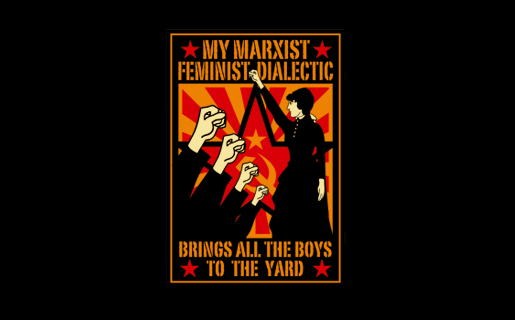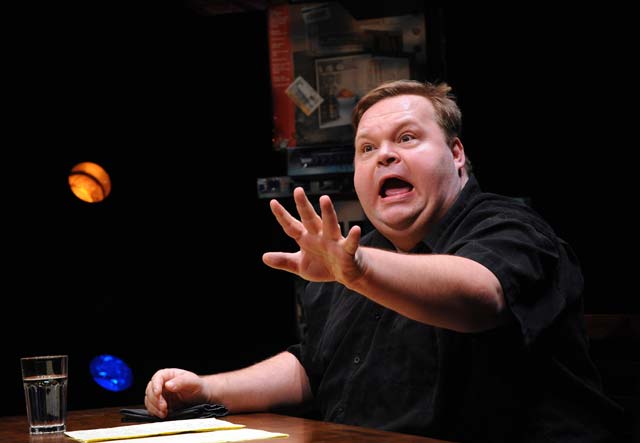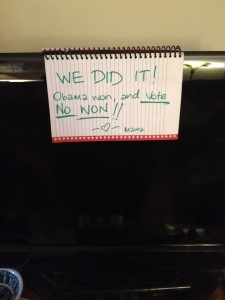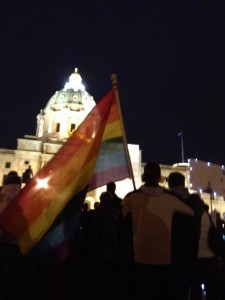 Sex Ed, Social Studies
Sex Ed, Social Studies  3 Comments
3 Comments Feminism at the Crossroads

A few times recently, friends have mentioned me on social media as a feminist they admire. As pleased and flattered as that makes me feel, I also get a strong twinge of guilt, or at least conflict.
I don’t think I’m a very good feminist. By the usual standards, I barely qualify for the title. I suffered through one lone Women’s Studies course, in grad school, with much whining and skepticism by both professor and me. I don’t know all the lingo. I can’t take the Pill. You’ll never catch me burning my bra–they were so damn hard to get fitted correctly in the first place.
Okay, that list is pretty unserious, at least in 2013. But I do feel some considerable shame as emails about reproductive choice, equal pay, sexual harassment, gender balance in the media, and any number of other “feminist issues” pile up unanswered in my inbox while I put in hours upon hours on the phone and in the Capitol for rights that may not even benefit me directly.
I want to be worth the faith of those folks who think of me when they hear the word “feminism,” and I want my feminism to be clear in its intent. My feminism sits at the intersection of race and privilege, of sexual and gender identity, of educational and economic advantage, of communication and culture. My feminism is a human right, and it casts a broad net: I become aware of another injustice that touches my feminism because I feel the tug on our common lines, however far away from me it is.
But if your feminism extends so far, what kind of feminism is it at all, you may be asking? If you can find your way, as I do, to issues as diverse as same-sex marriage, teaching multiculturalism, comprehensive health care, rape culture, and the environment, shouldn’t I call it something else? Is my gender the only thing that makes me a feminist?
My answer is no. Women deserve to have their whole voices to be heard. We are more than half of the world population, so if there’s an issue that affects the world, it affects women and we deserve to have a say in it. Women are not a monolith–this gets said frequently, but it bears repeating until it sinks in. We do not all have the same view on issues; there is no such thing as the “women’s vote.” Our circumstances are varied as our bodies.
That said, the common composition and experience women share give us a different perspective than men have, and if we want to build the world to be a more inclusive place for us, our vision has to influence that construction. A quick anecdotal example: My boys were born four years apart. We still had all the baby equipment from Connor when Griffin was on his way, but by way of a mistake and a generous gift, we ended up with a brand-new stroller set to replace our used one. I finished unpacking it and went to set it up for maximum admiration. Remembering the mechanics of our old set, I went at the frame with both hands, but all it took was a flick of my thumb and a twist of the wrist, and it sprang up fully. Instantly, I realized: in those four years, women engineers entered the design room. I’m not saying that men couldn’t design a good stroller. But it felt like a mom who’d wrestled a purse, a crying baby, and a diaper bag spilling its contents into the parking lot had finally had a say in what was needed.
Not every woman is a mom, or even wants to be one. Not every woman will even need that stroller, let alone be able to afford it. Not every woman can even imagine the luxury of letting something other than her hardworking body support the weight of her child for a single moment of the time until that child can toddle along under its own power. And increasingly, many men are partners in parenting who can appreciate one-touch strollers and other magical technology that makes the work of raising a child just a bit easier.
But women experience the world differently than men, and that difference makes us valuable as we search for solutions. Every problem in the world affects women, and we can and should contribute to efforts to counteract problems with our particular set of visions and skills. Strengthening the institution of marriage by making it accessible to anyone who will take that stand for love and commitment benefits women. Teaching multiculturalism to children (and adults) makes us more sensitive and appreciative of the differences, unique histories, and commonalities among people with other races and cultures, which benefits women. Comprehensive health care benefits women’s bodies, as well as improving their ability to participate fully in the economy, to the benefit of their families. And we all live on this planet that changes and suffers and recovers and goes unheeded, like the bodies of too many women who experience the world as a violent place, and they all need healing for life to flourish.
So my feminism will be intersectional. Senator Paul Wellstone used to say, “We all do better when we all do better.” So I’ll work on the issues that resonate with me and my experience as a mom, a wife, a teacher, a bisexual, a pagan, an autistic, a Unitarian Universalist, a white person, a survivor, and the many other people who live inside this woman’s body. One of them is a feminist.

 Or worse: you could end up like Mike Daisey. He’s a performer who got a lot of attention for a one-man show called
Or worse: you could end up like Mike Daisey. He’s a performer who got a lot of attention for a one-man show called 
 Almost every good and wonderful thing about the winter holidays is a sensory delight. The smells of cold snow and freshly cut pine and butter-rich cookies tingle in our noses. Pipe organs and French horns and jingly bells and heavenly choirs and crinkly paper delight our ears with musical sounds rarely used in the rest of the year. Velvety and satiny fabrics combine with delightfully scratchy sweaters and fuzzy hats in our special party clothes. We write ourselves dietary hall passes for the dozens of special, luscious holiday foods. And the lights…oh, the lights! Who doesn’t gasp and crane at the sight of an elaborately decorated building or brilliantly lit tree?
Almost every good and wonderful thing about the winter holidays is a sensory delight. The smells of cold snow and freshly cut pine and butter-rich cookies tingle in our noses. Pipe organs and French horns and jingly bells and heavenly choirs and crinkly paper delight our ears with musical sounds rarely used in the rest of the year. Velvety and satiny fabrics combine with delightfully scratchy sweaters and fuzzy hats in our special party clothes. We write ourselves dietary hall passes for the dozens of special, luscious holiday foods. And the lights…oh, the lights! Who doesn’t gasp and crane at the sight of an elaborately decorated building or brilliantly lit tree?

 I cringe as soon as I hear the bell ringing in front of the grocery store. My kids are primed to be generous, and immediately pester me for pocket change to put in the red bucket. I tell them “no” quietly and, to head off the inevitable “why” that follows, say, “They don’t believe they have to help everyone who comes to them in need, and I don’t want to support that.” I fast-walk the boys into the store and give the bellringer a tight smile.
I cringe as soon as I hear the bell ringing in front of the grocery store. My kids are primed to be generous, and immediately pester me for pocket change to put in the red bucket. I tell them “no” quietly and, to head off the inevitable “why” that follows, say, “They don’t believe they have to help everyone who comes to them in need, and I don’t want to support that.” I fast-walk the boys into the store and give the bellringer a tight smile.

 The term mandate comes directly out of Latin, which is unsurprising, since most ideas of political power were defined—in one way or another—by those experts in bureaucracy, the Romans. But the etymology suggests something more of a public trust: mandate means “to give into the hand” (manus = hand; dare = to give). Romans used the past participle, mandatum, to mean something given into a person’s care.
The term mandate comes directly out of Latin, which is unsurprising, since most ideas of political power were defined—in one way or another—by those experts in bureaucracy, the Romans. But the etymology suggests something more of a public trust: mandate means “to give into the hand” (manus = hand; dare = to give). Romans used the past participle, mandatum, to mean something given into a person’s care.  So there’s already both a political/legal sense of the word that existed alongside a very spiritual idea of trust and care. And the Romans weren’t the only ones to invest the word mandate with those dual meanings. Ancient China, starting in the Zhou Dynasty (1046-256 BCE), ascribed its rulers with the mandate of heaven. To the Western eye, the mandate of heaven looks like a version of the divine right of rulers. But in China, the endorsement of the divine depended on continued moral leadership (both leadership with morals and demonstrating exemplary morals), and if the leader was not sufficiently generous, just, conservative (in the small “c” sense of conserving tradition and resources for future generations), and observant of religious obligations, then Heaven would revoke its mandate. This could serve as justification—even an endorsement—for popular uprising and the overthrow of the regime. (1)
So there’s already both a political/legal sense of the word that existed alongside a very spiritual idea of trust and care. And the Romans weren’t the only ones to invest the word mandate with those dual meanings. Ancient China, starting in the Zhou Dynasty (1046-256 BCE), ascribed its rulers with the mandate of heaven. To the Western eye, the mandate of heaven looks like a version of the divine right of rulers. But in China, the endorsement of the divine depended on continued moral leadership (both leadership with morals and demonstrating exemplary morals), and if the leader was not sufficiently generous, just, conservative (in the small “c” sense of conserving tradition and resources for future generations), and observant of religious obligations, then Heaven would revoke its mandate. This could serve as justification—even an endorsement—for popular uprising and the overthrow of the regime. (1) But, more than ever, it’s important for our leaders to proceed knowing, as the Romans and Chinese knew, that they hold their power in their hands—they hold the people in their hands. And it is a fragile thing, so easily crushed by inattention and the flexes of muscle demanded by other parts of the job. Though Bush’s presidency represented it in absolutely no way at all, I appreciate the idea of “compassionate conservatism.” The people and their trust must be treated with compassion, not ruthless budgetary efficiency or wasteful military squandering, or neither of them can be conserved for the good of the country’s future.
But, more than ever, it’s important for our leaders to proceed knowing, as the Romans and Chinese knew, that they hold their power in their hands—they hold the people in their hands. And it is a fragile thing, so easily crushed by inattention and the flexes of muscle demanded by other parts of the job. Though Bush’s presidency represented it in absolutely no way at all, I appreciate the idea of “compassionate conservatism.” The people and their trust must be treated with compassion, not ruthless budgetary efficiency or wasteful military squandering, or neither of them can be conserved for the good of the country’s future. 


